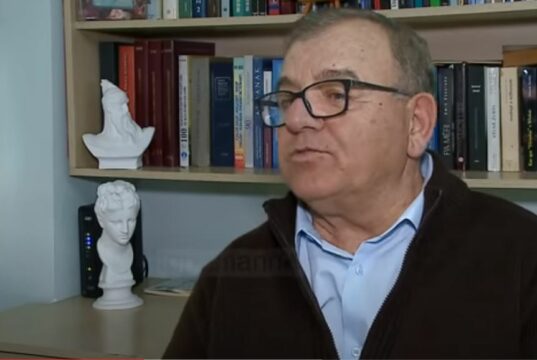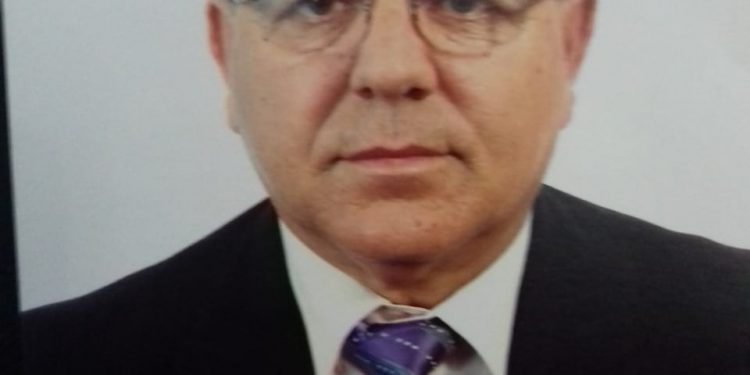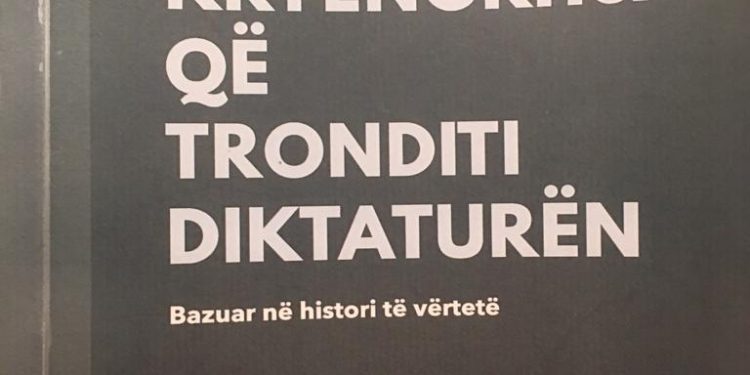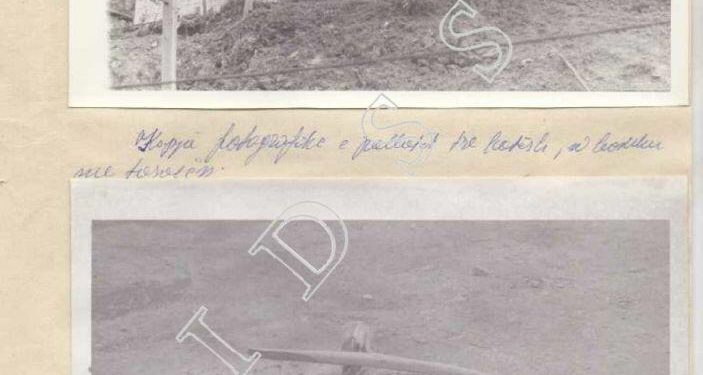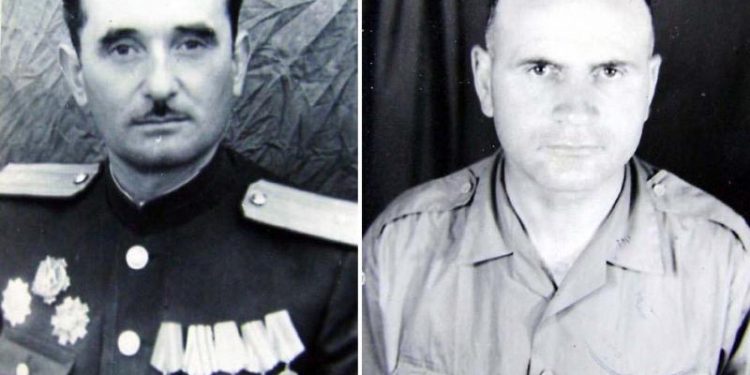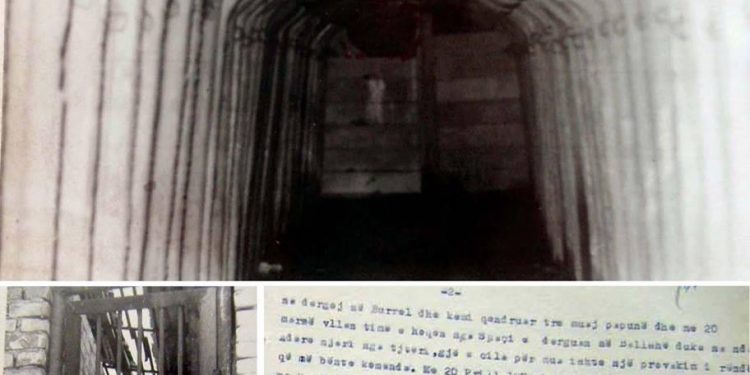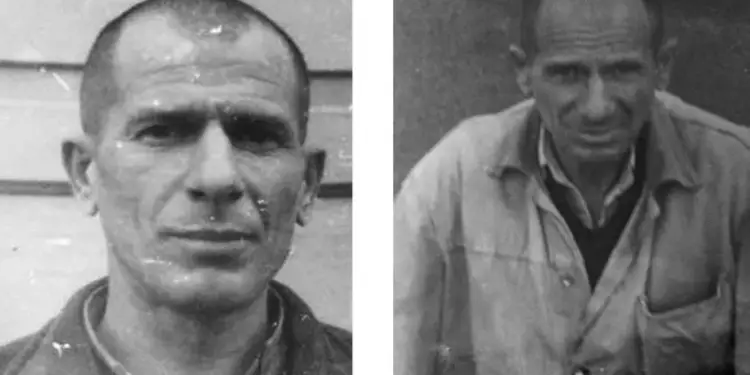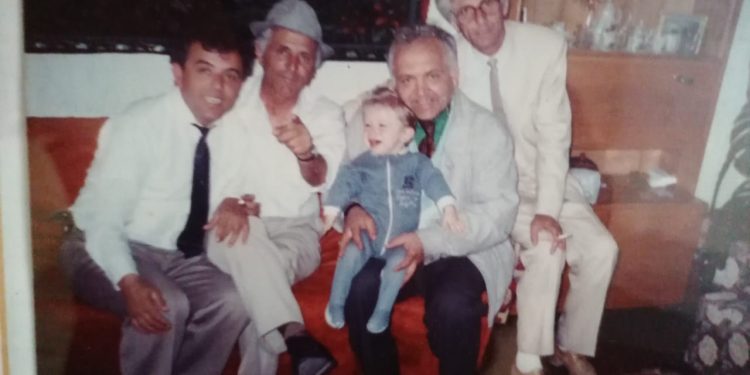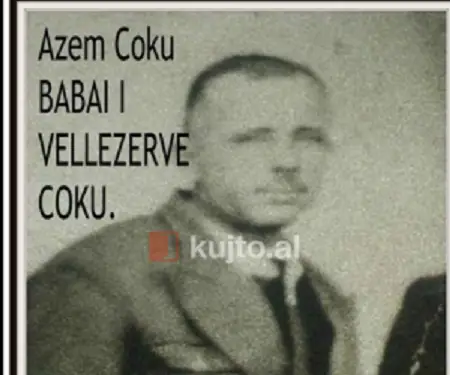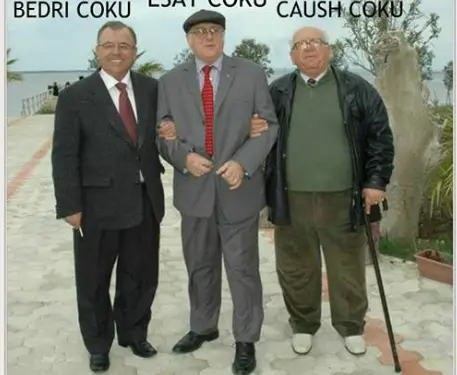By Bedri Çoku
The fourth part
Memorie.al publishes the unknown testimonies of Bedri Çoku, originally from the village of Muçias in the district of Lushnja, who at the age of 19, while performing compulsory military service in the district of Gjirokastra, was arrested by two senior State Security officers and after a public “unmasking” trial with accusations mounted in the cinema of that city, he was convicted for agitation and propaganda together with his brother, Çaushi, for the only “fault” that their father had suffered several years as a prisoner in the forced labor camps from where he was released in 1959. The rare testimonies of Bedri Çoku who spent 24 years in the prisons of Spaç, Burrel and Qafë Barit and together with his two brothers, Esat and Çaushi and their father, Azemi, suffered 64 years in prison in the camps and prisons of the communist regime of Enver Hoxha, being released only in February 1991. Memories of Bedri Çoku masterfully described in his book “The uprising that shook the dictatorship”, which where is mainly added to the Spaç Revolt in May 1973, where he, as one of its main organizers, sheds light for the first time by making public some unknown events and facts from that revolt where the flag was raised without the red star of communism, and until his work as General Director of Camps and Prisons after the ’90s, where he “arrested” his close friend, the accomplice of the dictatorship’s camps and prisons and sent him to the cells of’ Prison 313 ‘. Tirana, where most of the former Political Bureau of the Central Committee of the ALP headed by Ramiz Alia and Nexhmije Hoxha were serving their sentences.
The uprising that shook the dictatorship
(Based on a true story)
“To raise the flag, without the communist star, I expressed the opinion that, unable to find a red sheet, we would break our hands and, with our blood, paint the white cloth…! The first to cut his hand with a knife was my brother, Çaushi, the second Gëzim Medolli, Bedri Çoku, Gjet Kadeli, Ulsi Pashollari, and others…”
We very much hoped for European Security and Cooperation which was being carried out with dizzying speed under the special care of the United States of America. Rightly all mankind was eagerly awaiting the great historical moment. Signing for the Understanding of the Peoples of Europe, Western Democratic States and Eastern Communist States, which were still suffering from dictatorial regimes, to establish together a new order of peace and cooperation in the world. We hoped that Albania on this occasion as well. She would sign in Helsinki this Act for the Fates of Humanity, as a representative of this International Political Organization. We were convinced that our country, though incomparable to the countries of the East, would, by grace or inadvertence, join the Treaty of Peace and Cooperation with Europe (OSCE).
Author
Continued from the previous issue
REBELLION
He refused to paint the flag of the uprising, while Gjet Kadeli, with his carpentry craft, had joined two rows of planks and made the long spear with them. Out of impatience, we decided to raise that fabrication, like a flag, on the terrace of the palace. We set off with it in hand, waving it in the air. I remember that Lukja, Gëzim Medolli, Naim Pashai, Murat Marta and some others came with us, but without reaching the second floor of the palace, with the red meringue without the eagle, rumors came from below that, Mersin Vlashi, from Burreli, self-taught painter and sculptor, he had expressed a willingness to paint the eagle. He was with Dervish Bacon, who, as Mersin later told me, he had taken to paint the flag. Ahmet Zogu’s roommate, Mersini started and finished the eagle, with Skanderbeg’s helmet, for almost a quarter of an hour. The eagle of Mersin Vlash, even today when I remember it evokes great emotions. We raised the National Flag, without the infamous communist star, on the terrace of the three-story palace, and, to our delight, it magically began to flutter as if the eagle painted on it was the very breeze of our souls.
Inspired by this special event, unforgettable and historic for my life, I gave the floor, on the balcony of the third floor, addressing hundreds of prisoners, who enthusiastically cheered and cried with joy…! The flag of Skanderbeg and Ismail Qemali, which was flying free and proud, after so many years under communist captivity, badly deformed and tarnished with the symbols of proletarian internationalism, aroused without hesitation extraordinary enthusiasm. Although some musicians with their guitars who created the musical ensemble led by the former trumpeter of the State Ensemble, Ali Hoxha, had the opportunity to perform the anthem of the National Flag, but … out of fear they did not. It was done by the other prisoners themselves who sang the anthem, with their voices hoarse from calls against the dictatorship and the leaders of the state and government…! The words came out of my mouth, as if the divine spirit were inside me, when I said exactly those words, which Naim Pashai, has faithfully repeated in his novel, “The Reconciled Life”:
“Dear comrades! This is the flag washed with the blood of hundreds of thousands of Albanians, in the centuries-old wars for freedom and justice. This is the flag of the ideals of our ancestors and ours…!
“Applause and strong hatred,” writes Naimi Pashai, “shook those mountain gorges. Extraordinary emotions. Tears, longing, joy, hugs and congratulations to each other.
The flag was waved for two days and two nights on the terrace of the palace. And, to save him, even with their lives, volunteers came out, Shuaip Ibrahimi from Shkodra, Ndrec Çoku, from Mirdita and Jonuz Norja from Shijak and others, who, fortunately, were not arrested by the police, as ‘were arrested many by other insurgents. Raising the Flag added to our patriotic feeling, but also our sublime duty to protect it, until death. There were now hundreds of mourners in the camp, staring up at the upper terrace, ready to be sacrificed, if anyone dared to lower from the pedestal the National Flag, which reigned proudly after several decades of despair…!
With his erection, not only in the camp, but also outside the siege, the situation took a different look. The taste of freedom and pride prompted us to act more than we had done so far, while beyond the barbed wire, the noises of military vehicles with heavy reinforcements and armaments abounded. Although the “Flag Morning” caused the triple tightening of our siege by the soldiers of the Burrel and Shkodra Corps, brought the sad news that the taps inside the camp were dry at dawn due to lack of drinking water. Officers of the dictatorship had also taken care to block the supply of bread and food. However, these savage measures did not, by any means, reduce the fire of our souls to continue the resistance against the dictatorship.
Drinking water was sorted out, somehow, as we were going to use what was in the shower tanks. Thankfully, the poet Ylber Merdani, the sucker of an anti-communist family, was in charge of them, who at once put the deposits to the use of the insurgents. Merdani even helped to hide our anti-regime manuscripts, in prose or poetry, in those places he knew well within the territory of the deposits.
As for food, we would use, “as in the siege”, those in the personal food warehouse, with the savings of each of us. For this reason, in the new conditions that were created, the organizers of the uprising, undoubtedly raised the issue of the state store within the camp siege, supplied with sugar, oil, cheese, sausage and other assortments, where prisoners bought with money there, according to the account held and controlled by the command. The money was that which came from the families of the prisoners, or earned from slave labor. By no means would it be in the honor of the uprising if someone, hungry, or a group of them, would smash the state shop.
Wouldn’t this be an action, equal to the theft or robbery that he could do, for example, a certain Ferit Lopa with friends, convicted several times for theft, and not without any purpose were among the opponents of the regime, just why, most likely, they had justified the theft revealed in flagrante delicto, for economic reasons, a dissatisfaction which, according to Article 73, was considered agitation and propaganda against the (non) popular power. Such convicts had nothing to do with the “status” of a political prisoner…!
Although above the camp, on the bare mountain of Spaç, the black muzzles of the anti-aircraft guns were already visible, like a swarm of monsters, ready to fire on any aircraft that could fly unauthorized, on those hundreds of square meters “occupied by the enemy”. as well as hundreds of soldiers with steel helmets on their heads, in frontal positions, for a real fight with the convicts left without bread, without water. However, the firm decision of the insurgent leaders was: “The state shop would be preserved untouched, at any cost and at any price!”
For the implementation of this decision were selected two of the boys who instilled more confidence to approach in this mission, the strongmen of the camp, for whom it was the belief that they would carry out correctly, the “Decision of Honor”. They were: Murat Marta from Elbasan and the burly Pogradec resident, Dervish Bejko, although both of them did other much more important tasks for the uprising. Touching the store without question that would distort the content of the uprising.
Although the pros and cons of maintaining the store were hotly debated, especially with people without family assistance, it remained intact, as had been left by the seller himself, a Halleji from Rrepsi, who came to Spaç to feed the toads. own…!
The raising of the flag, not only outside the siege, caused the events mentioned above, but also inside the camp major changes took place. The shunned and distrustful prisoners, until before the raising of the flag, especially the old and elderly prisoners, on this occasion approached the uprising seriously. The dire situation created by the government clique, after the flag was raised without the communist star, forced the learned and patriotic men to see the necessity of creating a Provincial Council, with wise and experienced people, in such hot situations, as in our case, where not only the lives of the people inside the camp were endangered, but also the pain and dignity of their relatives. While the national issue, without a doubt, had its own most important background.
The Provincial Union, in my opinion, was another great achievement in the days of that event, which culminated in wise and righteous decisions, for the time and circumstances created, combining both important issues: The fate of the people and values national! But what were the decisions? The Provincial Union was formed with four people for each province of the country, in some cases even three, while its Council took decisions with a representative from each province. The first decision was taken by unanimous vote not to surrender and to defend the flag, until death.
The second decision was related to the attitude that would be held towards the numerous spies and informants of the command, which the Provincial Council found reasonable, that in conditions of war they should not be sentenced to death, as is usually the case with martial law. Their death sentence would be a fatal mistake, according to advisers, not only for the fate of the uprising, but also for the next day, for the fate of the nation, when Albania would be liberated from communism controlled by the Russians and Serbs.
It was argued that, after all, they were unfortunate. Some had become forced informants from the most inhumane forms of State Security, while others who happened to be in prison, without any prior persecution, had been constantly intimidated and deceived. (Unfortunately, it must be said that the latter category is being cunningly used even today by the media of the pluralistic system, to make false policy towards the truth, for political prisoners, real opponents of dictatorship and fighters for democracy.) While, for persons who had espionage in their blood, were left to be tried at another time, when the Rule of Law was established in Albania.
Finally, after many vicissitudes, the Provincial Council came out with the slogan: “Reconciliation!” But, provided that all these qualified command informants and others known as State Security collaborators, would be forced to appear before their accomplices and denounce aloud incessantly, the government and the regime that had morally distorted them. …! Otherwise, they would receive the punishment they deserved.
Thankfully a good part of them accepted the decision of the Provincial Council and came out openly before the accomplices, denounced the dictatorial dictatorship state, cursed the communist regime and leaders for the deceptions used, which they had morally and physically harmed their comrades and friends with slander and fabrications, in the interest of the State Security, which imprisoned, interned, or eliminated them. The rest were counted by finger, who could not come out to implement the decision of the Provincial Council.
They apologized because of their poor health, or because they were in mourning for the dead relatives in the last days…! Their reasons were accepted. The day the camp unfurled with the flag waving on the terrace, without the star of proletarian internationalism, across the wires reinforced by hundreds of soldiers and police, around nine o’clock, the director general of state police, Kasëm Kaçi, appeared with a megaphone in his hand… He called for us to surrender and go to work and even threatened harsh intervention if we were to continue the revolt. He took the rest, at once, from our powerful calls against communism and the clique that ruled the country. “Freedom, democracy”, “Long live the United Europe”, “Long live democratic America”, “Down with the communist dictatorship”!
In a moment of calm, as echoes from a deep abyss, suddenly was heard the hoarse voice of Luke, addressed to the senior military, the Chief of Police of the Republic: – “Kasëm Kaçi, Kasëm Kaçi! We know each other very well. I am Luke, the one who interned me in the swamp of Narta…! You are a burnt paper, you idiot! Therefore, leave before it is too late! Nobody believes you, you puppy of Enver Hoxha ”!
Kasemi left, with his tail between the saddles. But the situation was further aggravated, not only by Luke’s words, but also that behind the kitchen, between the wires and the guards in the barracks, two of our grenades exploded, echoing the insulting words about the high military of the state. Immediately came the response of the besiegers with a series of machine guns and machine guns…! People inside the camp fell to the ground. Almost an hour passed that our calls did not stop, asking for help from the western states, chanting slogans against the dictatorship, when, seen in the background of the curfew, in front of the command, a man appears accompanied by a pretty bridge!
He stands in front of the camp and looks straight, not at us, but beyond the wires of the siege, disregarding and careless, as if he were a man coming from the cosmos. It was Fiçor Shehu, the deputy interior minister of the government and one of the main leaders of the State Security. He started speaking in a softened language, thinking we would cut off calls against the government and listen to his broccoli. On the contrary. Exactly why he was there, we added more calls. He asked for a representative to talk to him. But we reprimanded him, showing him that he was as “important” as the others around him. But, to everyone’s surprise, without talking to anyone, two of the prisoners, independently of each other, crossed the gate of the restricted area and went in front of Fiçor Shehu.
There were rumors that the head of the State Security, Kadri Azbiu, had meanwhile been seen entering the command offices. However, their conversation with Fiçor Shehu was not heard by the powerful calls. Meanwhile, my friends, who were also members of the Provincial Council, advised me to go to Fiçor Shehu, so as not to let them both speak on our behalf.
As I passed the gate and found myself in front of Ficori, the prisoners’ shouts faded. I deliberately stepped in between the two and interrupted Paulin Vata’s conversation with the deputy minister. Vata had been sent to Yugoslavia on a mission by the Albanian state, but because he had failed in the secret mission, the Yugoslavs discovered him and imprisoned him. Immediately, as soon as the sentence given by the Yugoslav state ended, he was withdrawn to Albania, where he was convicted of “treason”, according to the laws of Albania. The other, who did not speak at all, was Nuri Stepa from Tirana, an honest and correct man.
Suddenly found between the two, P. Vata interrupted the conversation with the deputy minister, but my ears caught some of his words, which I understood that he had simply personal issues with him, because he felt betrayed by the Albanian state, especially by the authorities of State Security. I find it reasonable to make an intervention to reflect the truth of this moment, through the testimony of another re-convicted person in the Spaç uprising, given to “Shijak TV”, Spiro Nasho. A man of character who never sought ease. Loved and respected by fellow sufferers. This is part of his interview:
Twenty-four cars with soldiers and ammunition arrived in Spaç on Sunday. He was accompanied by Kasem Kaçi, Director of the State Police. He read to us the decision of the government, which said: ‘If by tomorrow, at nine o’clock, you do not surrender, the state will use all the means at the disposal of the dictatorship of the proletariat. We will crush you with iron fire, if need be. ‘ After that the police made another attempt to enter the camp, but it was impossible, as we were well organized and united with each other. Then came Fiçor Shehu, accompanied by Kasem Kaçi and the camp commander, Haxhi Gora. They said there were 600 policemen surrounding our camp and waiting for the order to attack us. Ficori asked for a representative to talk to him. P. Vata and N. Stefa went to the meeting, inside the wires. But after a while went and Bedri Çoku, an invincible boy. But … Hajri Pashaj was brave above the brave, when he confronted Fiçor Shehu, telling him that he was the son of Zenel Braushi, his fellow villager, who, once, he and his friends “took off his hat”. Then Hajri severely insulted Fiçor, when he told him that your father was a criminal who dealt with the elders of the village…! The debate with Fiçor brought him death at such a young age… ”
I submitted to the Deputy Minister our demands and views regarding the revolt and the raising of the National Flag, without the communist star. Ficori kept insisting that we lower the flag and go to work, and even started threatening that we would pay more than we thought, if we continued like this. But my insistence on defending our rights and ideas regarding forced labor and inhuman treatment was accompanied by the approval calls of all. Enraged, Fiçor Shehu threatened to order the army to attack with everything he had, and even to kill us with napalm, if there was a need to exterminate us. /Memorie.al
Continues in the next issue




